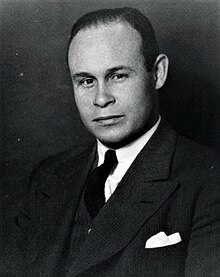Charles Drew
| Charles Richard Drew | |
|---|---|

Charles Richard Drew
|
|
| Born |
June 3, 1904 Washington, D.C., U.S. |
| Died | April 1, 1950 (aged 45) Burlington, North Carolina, U.S. |
| Nationality | American |
| Fields | General surgery |
| Institutions |
Freedman's Hospital Morgan State University Montreal General Hospital Howard University |
| Alma mater | Amherst College, McGill University, Columbia University |
| Doctoral advisor | John Beattie |
| Known for | Blood banking, blood transfusions |
| Notable awards | Spingarn Medal |
Charles Richard Drew (June 3, 1904 – April 1, 1950) was an American physician, surgeon, and medical researcher. He researched in the field of blood transfusions, developing improved techniques for blood storage, and applied his expert knowledge to developing large-scale blood banks early in World War II. This allowed medics to save thousands of lives of the Allied forces. The research and development aspect of his blood storage work is disputed. As the most prominent African-American in the field, Drew protested against the practice of racial segregation in the donation of blood, as it lacked scientific foundation, and resigned his position with American Red Cross, which maintained the policy until 1950.
Drew was born in 1904 into an African-American middle-class family in Washington, D.C. His father, Richard, was a carpet layer and his mother, Nora Burrell, was a teacher. Drew and his siblings grew up in D.C.'s Foggy Bottom neighborhood and he graduated from Dunbar High School in 1922. Drew won an athletics scholarship to Amherst College in Massachusetts, where he graduated in 1926. An outstanding athlete at Amherst, Drew also joined Omega Psi Phi fraternity. He attended medical school at McGill University in Montreal, Quebec, Canada, receiving his MDCM in 1933, and ranked 2nd in his class of 127 students. A few years later, Drew did graduate work at Columbia University, where he earned his Doctor of Medical Science degree, becoming the first African American to do so.
...
Wikipedia
